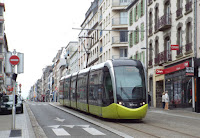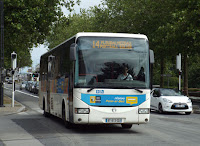The city of Brest lies near the north-western tip of France. It is a naval port, which suffered extensive bombing during the Second World War. As a result, much of the city centre's architecture and streets date from the post-war era.
 In recent decades, trams have been reintroduced to more than twenty French cities. Brest is amongst them, with a single cross-city route which opened in 2012.
In recent decades, trams have been reintroduced to more than twenty French cities. Brest is amongst them, with a single cross-city route which opened in 2012.
Across the heart of the city, the trams run along streets which are closed to other traffic (including buses)
The bus fleet comprises a mix of standard and articulated vehicles.
Other urban bus services were operated mainly by standard single-deckers with three sets of doors.
 Although most of the buses carried a white and pale green colour scheme, I found one in an older livery of white and yellow.
Although most of the buses carried a white and pale green colour scheme, I found one in an older livery of white and yellow.
Articulated buses were not limited to route 1.
I found them operating alongside standard vehicles on several other routes.
 Although Brest does not have a metro, its urban public transport system does have another component.
Although Brest does not have a metro, its urban public transport system does have another component.
A cable car opened in 2016, spanning the river to link the city centre on the east bank with an area on the west which is undergoing regeneration.
Brest's cable car system comprises two cars. Unusually, they pass one above the other rather than side-to-side.
The cable car is fully integrated into the transport system. It operates 7 days a week, all year round (apart from a one-week maintenance closure).
The tram, bus and cable car network is provided by BiBus.
Fares are simple. At the time of writing, a single journey ticket costs €1.60. This allows unlimited transfers between buses, the tram and the cable car for up to an hour. 10-journey tickets are available for €12.50. An all-day ticket costs €4. At weekends, up to four people can travel together using one all-day ticket. Three and seven day tickets are also available, along with longer period tickets.
This differs from those I have seen in many other cities, as bicycles are hired for 3, 6 or 12 months rather than for individual casual journeys.
At least one operator of "dockless" cycle hire had bikes in Brest when I visited.
Information about these services is available in French only on the Viaoo29 website.
I found high-floor vehicles operating most of these services. Most carried branding for the network, under the name "Réseau Penn-ar-Bed"
Fares on the Réseau Penn-ar-Bed are simple. A €2 fare applies for all journeys other than on the route from Brest to Quimper, where the fare is €2, €4 or €6. The Brest-Quimper route is divided into three zones, the fare depending on the number of zones you travel through. 10-journey tickets are available for €15 (or €30 or €45 for longer journeys on the Brest-Quimper route). Réseau Penn-ar-Bed tickets allow transfer onto the BiBus network in Brest at no extra charge.
The bus station is also the main stop for longer-distance coach services which operate into Brest.
As far as I can tell, these bus services are not available to the general public.
Images in this post were taken in June 2018.
































































































No comments:
Post a Comment